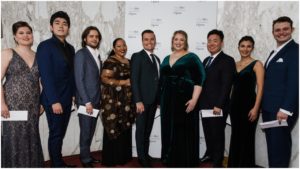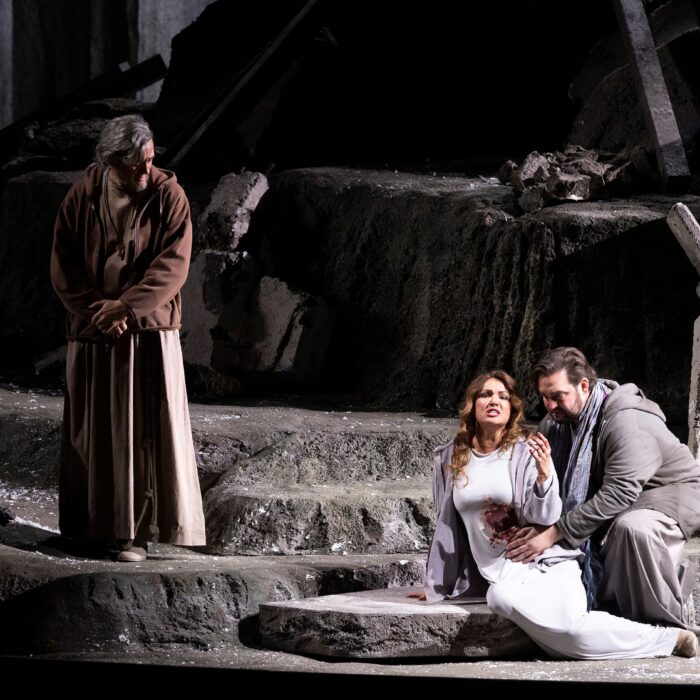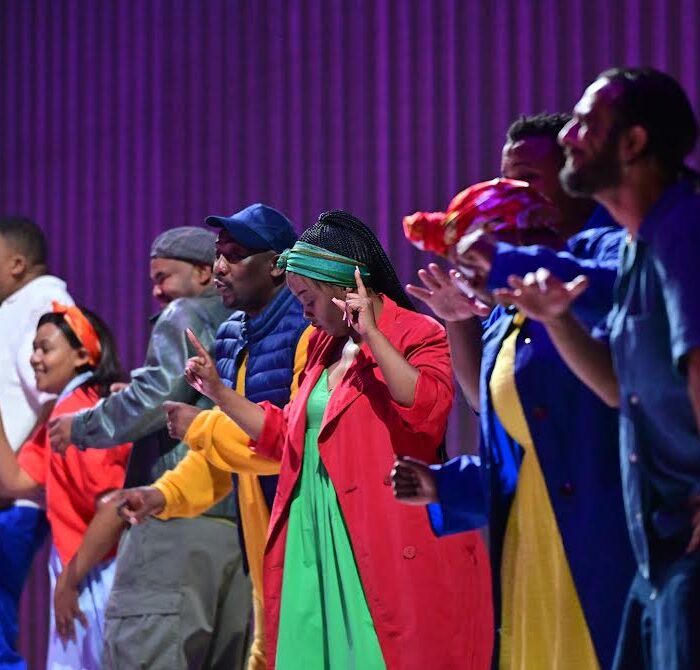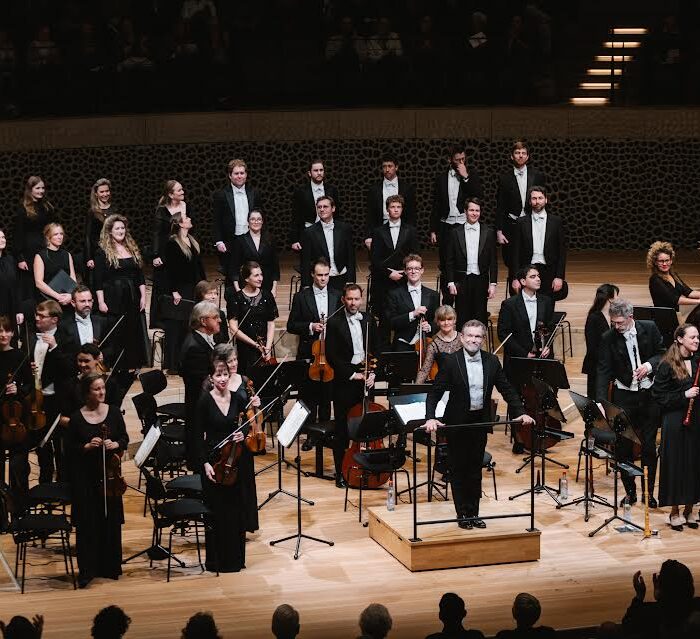
Metropolitan Opera 2018-19 Review: National Council Auditions Grand Final
By Logan MartellOn March 31, 2019, the Metropolitan Opera’s National Council Auditions were brought to a thrilling conclusion with their grand finals concert. Hosted by countertenor Anthony Roth Costanzo, nine young finalists took to the Metropolitan’s stage for the first time to share their artistic gifts with the audience.
Opening the afternoon’s concert was soprano Meghan Kasanders, singing “Dich, teure Halle’ from Wagner’s “Tannhauser.” Her excited energy led her about the stage during the introduction, before Kasanders delivered her opening lines with a clear, resonant vibrato. The dissonant woodwinds from the orchestra brought the aria into its second, faster section, which Kasanders navigated to a joyous conclusion to her first selection. Her second selection was the arioso “Otkuda eti slezy, zachem one?” from Tchaikovsky’s “The Queen of Spades.” This number made for a marked contrast due to its initial languid feeling. Kasanders’ driving phrases worked well with the underscoring of arpeggiated runs, which joined together with the brass to build towards a powerful finish.
Following Kasanders was tenor Dashuai Chen, whose first selection was “Fra poco a me ricovero… tu che a Dio spiegasti l’ali,” from Donizetti’s “Lucia di Lammermoor.” While this number started things with a slow tempo, the dramatic context of Edgardo’s crushed aria gave Chen ample emotions and vocal colors to explore. One example of this came in the hurt lingering he placed on the words “al felice consolte,” in referring to his perceived romantic rival Arturo. Chen’s first selection was finished with a powerful, high B –flat; his clenched, shaking fist conveyed the boiling of Edgardo’s emotions as the orchestra resolved to a close. His second aria was “Salut! Demeure chaste et pure,” from Charles Gounod’s “Faust.” His firm delivery of the recitative soon gave way to the tender infatuation of Faust. This affection also saw Chen begin to cover more of the stage and singing to the audience as one might among a crowd of friends.
One of the evening’s winners, soprano Elena Villalon was next for her first aria “Oh! Quante volte, oh! Quante,” from Bellini’s “I Capuleti e I Montecchi.” This selection made for a stunning showcase of Villalon’s vocal ability, employing silvery tones and leaps of anguished color. Her legato phrases rang clearly, as did the sustained diminuendo she used to scale her way back down from her passionate vocal heights. As the orchestra often dropped or made itself scarcer, Villalon showed herself not only comfortable with near-silence, but knowing how to break it as well. This sense of naturalness returned for her flexible cadenza which wove ornaments through the brief, aching, dramatic gaps of silence.
After Villalon’s first aria came tenor Miles Mykkanen, whose first selection was Lenski’s aria, “Kuda, kuda, kuda vy udalilis” from Tchaikovsky’s “Eugene Onegin.” After the soft but unsettled introduction from the cellos, Mykkanen opened with a poignant sorrow made all the more touching by his crisp diction. Through his rendition, it was not uncommon to hear a biting dejection tinge the end of his phrases, as he employed softly rolling consonants to begin stanzas. After working himself up to Lenski’s dramatic heights awaiting a duel to the death, Mykkanen de-escalated wonderfully with the way he sighed the phrase “akh, Olga, ya tebya lyubil!” His second aria, “Je crois entendre encore,” from Bizet’s “Les Pecheurs de Perles,” was of a similar romantic focus, yet Mykkanen’s artistry made this number no less mesmerizing. Nadir’s inner conflict was given with a gorgeous, expression as Mykkanen sustained these delicate tones with great control, earning the huge applause which followed.
Mezzo-soprano Michaela Wolz boldly took to the stage for her first aria, “Addio, addio, o miei sospiri,” from Gluck’s “Orfeo ed Euridice.” Learning of the possibility to return the soul of Euridice from Hades, Wolz energetically delivered no shortage of vocal roulades and ornaments, maintaining her support through her shifting courageous postures. Just as courageous was her final vault into the heights of her voice, portraying an Orpheus ready and eager to embark on the mythical journey into the underworld.
Tenor Piotr Buszewski followed, singing “Seul sur la terre,” from Donizetti’s “Dom Sebastien.” The dreamy harp introduction was punctured by passionate high strings, and in this musical atmosphere Buszewski displayed a highly soulful quality with his opening phrases. As he is swept along by this passion, Buszewski’s high Cs were handled with both strength and accuracy. His second aria, “Cisza dokola, noc jasna, czyste niebo,” comes from Moniuszko’s seldom-performed opera “The Haunted Manor.” The excited phrases often gave way to sustained notes, with Buszewski alternating between anger and apprehension. His anguished delivery was enough to draw applause from the audience, even before the aria was finished.
Baritone Thomas Glass made a strong impression with his first selection, singing “Captain Ahab? I must speak with you,” from Jake Heggie’s opera “Moby Dick.” The nautical feelings evoked by the wood winds were underscored with unease from the brass and lower strings. As he contemplated murdering Ahab, Glass’ rendition deftly captured the conflicting motivations as he searched for an answer while building to a near ramble. A sudden tone from a triangle caused Glass to snap into a more level-headed temperament, as heard by the hesitancy in the phrase “is it murder to strike a would-be murderer?” Glass’ dramatic and vocal anguish allowed him to ride aloft the massive swell of the strings, like a ship upon the sea’s waves, before the orchestra tapered to a close. His second aria was “Avant de quitter ces lieux,” from Gounod’s Faust. Here, Glass relished in the faithful certainty of Valentine asking God to protect Marguerite. This highly-present power allowed Glass to bring the aria to a strong conclusion.
Soprano Alaysha Fox came next, with “Don Ottavio, son morta!… Or sai chi l’onore,” from Mozart’s Don Giovanni. Fox’s lush soprano was bolstered by her dramatic sense, conveying the fresh horror and outrage of Donna Anna; her repeated measures did not lack in any punch, and retained their urgency as Fox continued in her pouring of lovely, indignant tones. Her second aria was “Ich ging zu ihm,” from Korngold’s “Das Wunder der Heliane.” Opening with an uneasy feeling due to the orchestral brass, Fox’s extended phrases soon unfolded into a powerful, sonorous account of compassion for a man condemned to death.
Last, but by no means least, was bass William Guanbo Su, whose first aria was “Sorge infausta una procella,” from Handel’s “Orlando.” Su started this classical piece with a clear and rich vocal weight. The highly melismatic nature of the text allowed Su to indulge in a series of strong, yet graceful, coloratura runs. This deluge of deep notes was halted by the phrase “splende fausta poi la stella che ogni cor…” which slowed and descended to the lowest reaches of Su’s bass register, holding it firmly before the ritornello. As the orchestra made itself scarcer, Su’s phrases accompanied by only the harpsichord did well in keeping the urgency of the aria going. His second aria, “Vi ravviso, o luoghi ameni,” from Bellini’s “La Sonnambula,” was relaxed and affectionate as he vocally explored the nostalgic scenery of Count Rodolpho’s hometown. As the feeling of the aria shifted towards the bittersweet realization of the passing of time, Su’s flexible ornaments were capped off with a low, earthy fermata delivered with a magnetic power.


